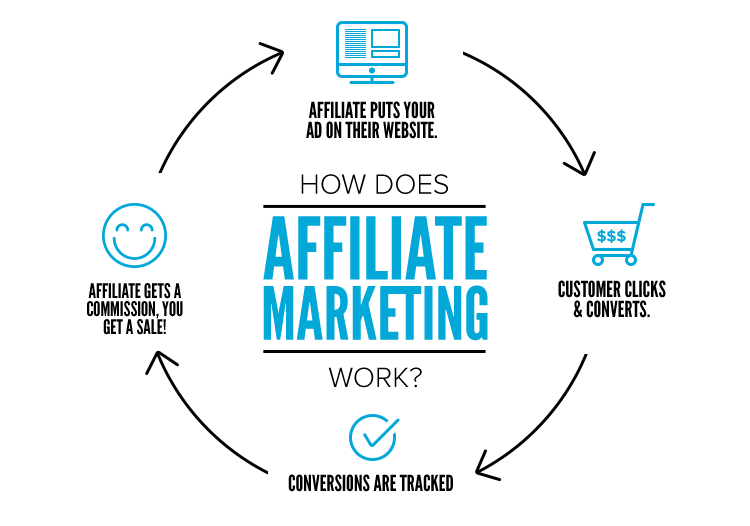The meaning of affiliate marketing can be elusive to some. What does it mean to do affiliate marketing?
af·fil·i·ate mar·ket·ing
noun
noun: affiliate marketing
What is affiliate marketing?
Affiliate marketing is a popular online marketing strategy where individuals, commonly known as affiliates, earn a commission by promoting products or services to their audience through a unique affiliate link. The affiliate link tracks the sales or leads generated by the affiliate, and commissions are paid out accordingly.
Ready to start? Click this link: How to Start Affiliate Marketing
More on the meaning of affiliate marketing and how it all works:
Let’s dig a bit deeper into the meaning of affiliate marketing and discuss the components of the affiliate marketing process….
What is an affiliate?

An affiliate (also known as a publisher), in the context of affiliate marketing, is a person or company that promotes products or services owned by another person or company, known as the merchant or advertiser, in exchange for a commission.
Affiliates use various marketing methods such as content creation, social media promotion, email marketing, or paid advertising to drive traffic to the merchant’s website or product page.
When a visitor clicks on the affiliate’s unique referral link and makes a purchase or completes a desired action, such as signing up for a newsletter or filling out a form, the affiliate earns a commission from the merchant.
Affiliates can range from individuals to businesses, and they can work with multiple merchants to promote a variety of products or services.
What is a referral?

In affiliate marketing, a referral refers to a customer who clicks on an affiliate link and performs a desired action, such as making a purchase or signing up for a service. The referral is tracked by the merchant through the unique affiliate link, and the affiliate earns a commission for each successful referral.
Referrals are the lifeblood of affiliate marketing, as they are the key to earning commissions. Affiliates work hard to drive traffic to the merchant’s site and persuade their audience to make a purchase or take a desired action. Referrals can come from various channels, such as social media, blogs, email marketing, and paid advertising.
Tracking referrals is critical to the success of affiliate marketing programs. Merchants typically provide affiliates with a unique affiliate link that contains a tracking code to identify referrals. This allows the merchant to track the number of referrals generated by each affiliate and calculate the commissions owed.
What is the merchant?
In affiliate marketing, the merchant is the company or individual who creates or owns the product or service being promoted by the affiliate. The merchant pays the affiliate a commission for each sale or action generated through their unique affiliate link.
The merchant is responsible for providing the product or service to the customer, handling payments, shipping, and customer support. Merchants also provide the unique affiliate links and other promotional materials such as banner ads, email “swipes”, videos and images.
They also set the terms and conditions of their affiliate program, such as commission rates, cookie duration, and marketing guidelines. Merchants can range from small businesses to large corporations, and they often rely on affiliate marketing as a cost-effective way to promote their products or services and reach a wider audience.
In some cases, the merchant will have an affiliate team and assign you an affiliate manager to help you be successful. In other cases, the merchant can be one person – who owns the service.
How does affiliate marketing work?

The beauty of affiliate marketing is that it allows individuals to earn money without the need to create their own products or services. Instead, they can promote products or services offered by merchants who are looking to increase sales or leads. Affiliates earn a commission for each sale or lead generated through their affiliate link, and merchants benefit from increased revenue without incurring high marketing costs. It’s a win-win arrangement.
What does an affiliate marketer do?
The affiliate’s role is to effectively market and promote the merchant’s products or services to their audience and persuade them to make a purchase or take a desired action, such as join a subscription service.
While this role was explained in it’s most simplest terms, there is a lot that goes into the customer-buying journey. How customers find affiliate products online doesn’t happen overnight. While paid advertising is often used, the best affiliates have websites with highly engaging content.
Affiliate Marketing Examples
Again, in simple terms, an affiliate sets up a website in a chosen niche and entices visitors (customers) to review the products they are promoting. When the visitor clicks on the unique affiliate link and sale is made, the affiliate earns a percentage of the sale.
Here is an example of an affiliate promoting wireless earbuds:

From the image, you’ll notice two buttons to click and purchase this product via Amazon OR Best Buy (the merchants). This affiliate has enrolled in both merchant affiliate programs.
Here’s another example from a website that reviews the best kitchen blenders:

Sales of products is typically a one-time purchase, but it can be hugely beneficial to promote services and subscriptions as many merchants in the top affiliate programs offer recurring commissions – meaning each time the subscription is renewed (monthly perhaps) the commission is paid to the affiliate, over and over again.
How do you promote products in affiliate marketing?

Affiliates can promote products or services through various channels, such as blogs, social media, email marketing, and search engine optimization (SEO). They can choose the products or services that they have used or enjoy and are passionate about, and they have the flexibility to promote them in a way that resonates with their audience.
One of the significant advantages of affiliate marketing is the low startup costs. Affiliates can get started with little to no investment, making it a viable option for those who want to start a business online. It also provides flexible working hours and the ability to work from anywhere with an internet connection.
However, affiliates must also overcome challenges to succeed in affiliate marketing. One of the biggest challenges is intense competition. There are many affiliates promoting similar products or services, making it crucial to stand out from the crowd. Affiliates must also comply with strict regulations, disclose their affiliate relationships, and build trust and credibility with their audience to effectively promote products and services.
Affiliate marketing is a profitable and low-risk way to earn money online. It offers individuals the opportunity to start a business without significant investment and provides flexible working hours. However, affiliates must put in the effort to stand out in a crowded market, comply with regulations, and build trust with their audience to succeed in the competitive world of affiliate marketing.
Pros and Cons of Affiliate Marketing

Affiliate marketing has its advantages and disadvantages that need to be carefully considered by anyone interested in pursuing this marketing strategy. One of the primary benefits of affiliate marketing is the low startup costs.
Affiliates can get started with little to no investment, making it a feasible option for those who want to start an online business without significant financial risks. Additionally, once an affiliate sets up their promotions, they can earn a passive income stream, making it a potentially lucrative option for those looking for ways to earn money online.
Another significant advantage of affiliate marketing is the flexibility it offers. Affiliates can work from anywhere with an internet connection, and they have the freedom to choose the products or services they promote. This allows them to align their promotions with their niche and audience, making it easier to persuade their audience to make a purchase or take a desired action.
Affiliate marketing also eliminates the need for affiliates to create their own products or services, which can be a time-consuming and costly process. Affiliates can promote existing products or services, saving them time and money. Additionally, they don’t have to worry about inventory or shipping, as those responsibilities lie with the merchant.
On the downside, affiliate marketing is highly competitive, and standing out from the crowd can be challenging. Affiliates must continuously optimize their promotions to improve performance and stay competitive. They must also comply with the terms and conditions of the affiliate programs they join and disclose their affiliate relationships to their audience, which can be complex and time-consuming.
Lastly, affiliate marketing earnings can be uncertain and are dependent on the merchant’s product or service quality and the affiliate’s marketing efforts. This can lead to earnings fluctuations and uncertainty, making it difficult to rely on one or two products for affiliate income.
What are the main types of affiliates?
There are several types of affiliates in affiliate marketing, each with a unique approach to promoting products or services. Here are some of the main types of affiliates:
- Content-based affiliates: These affiliates create and publish content, such as blog posts, videos, or social media posts, to promote products or services to their audience. Content-based affiliates typically have a niche or a specific audience they target, and they use their content to persuade their audience to make a purchase or take a desired action.
- Coupon and deal affiliates: These affiliates specialize in providing coupons, deals, or discounts to their audience to incentivize them to make a purchase. Coupon and deal affiliates often work with merchants to negotiate exclusive deals for their audience, and they typically have a broad reach and a large following.
- Loyalty and cashback affiliates: These affiliates offer cashback or reward programs to their audience to encourage them to make a purchase through their affiliate link. Loyalty and cashback affiliates typically have a loyal following and focus on building long-term relationships with their audience. They often work with merchants to provide exclusive cashback or reward offers to their audience.
- Influencers: Influencers are individuals who have a significant following on social media or other online platforms. They can be celebrities, bloggers, or industry experts, and they promote products or services to their audience through sponsored posts or endorsements.
- Comparison or review site affiliates: These affiliates create websites that compare or review products or services to help consumers make informed purchasing decisions. Comparison or review site affiliates typically have a niche or a specific audience they target, and they use their website to provide valuable information and recommendations to their audience.
As you can see, there are several types of affiliates in affiliate marketing, each with a unique approach to promoting products or services. The most common is content-based affiliates – producing articles (blogging), videos how-to guides, etc. Affiliates must choose the type that aligns with their niche, audience, and marketing style to succeed in affiliate marketing.
How do I start affiliate marketing?
Here are the basic steps to start affiliate marketing:
- Choose a niche: Select a specific niche or industry that aligns with your interests and passions. This can be a crucial step in determining what types of products or services you want to promote and who your target audience is. See top affiliate niches.
- Research affiliate programs: Look for reputable affiliate programs that offer products or services in your chosen niche. Ensure that the affiliate programs offer fair commissions, have a solid reputation, and provide adequate support to their affiliates.
- Build a website: Create a website or blog that caters to your chosen niche. Ensure that your website or blog is user-friendly, visually appealing, and provides valuable content to your audience.
- Create high-quality content: Develop high-quality content such as blog posts, videos, or social media posts that promote the products or services you want to sell. This content should be informative, engaging, and persuasive.
- Drive traffic: Use various marketing tactics such as SEO, social media marketing, email marketing, or paid advertising to attract traffic to your website or blog.
- Convert visitors into customers: Encourage visitors to make a purchase by using persuasive language, clear calls to action, and providing valuable incentives such as discounts or bonuses.
- Analyze and optimize: Continuously monitor your performance metrics such as click-through rates and conversion rates, and adjust your promotions to improve your performance and stay competitive.
Starting affiliate marketing may seem overwhelming, but with patience and hard work, it can be a profitable venture with the best return on investment when performed correctly.



